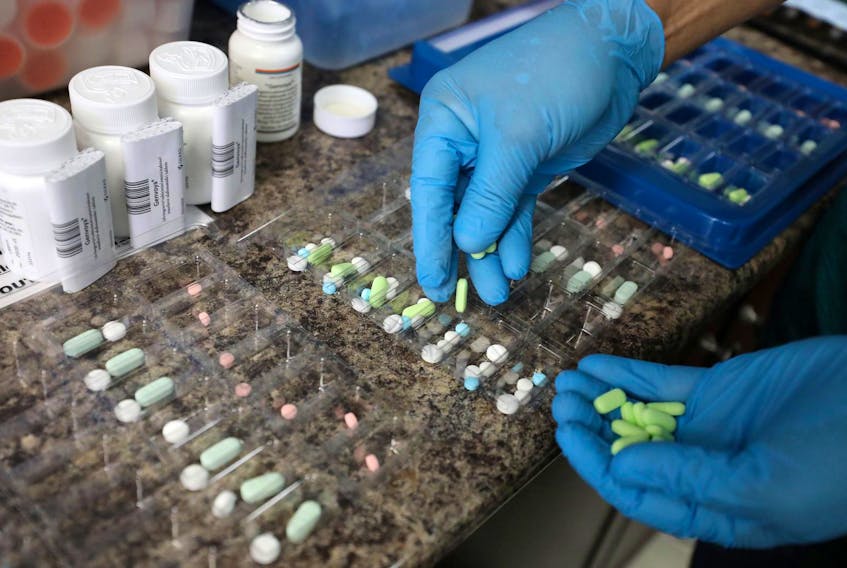The possible consequences of Canadian drug shortages are just beginning to be appreciated, and deserve to be an election issue.
In recent months, local pharmacies have notified me that certain drugs were suddenly on “backorder” for unknown reasons and an unknown period of time. Health Canada reports there are currently 1,848 drug shortages and 65 anticipated shortages.
Why are these drugs now temporarily unavailable? Is it increased global demand, a sudden lack of active ingredients, or vague manufacturing problems? No one can provide an answer.
The Canadian Pharmaceutical Survey conducted from Nov. 14-Dec. 3, 2018 revealed that in the past three or four years, drug shortages had greatly increased by 79 per cent and somewhat increased by 16 per cent. One in four adults in Canada has been personally affected in the past three years, or knows someone who has.
The situation is worsening. Three drugs used in cancer therapy — vinorelbine, leucovorin, and etoposide — are in short supply, as well as several for hypertension, heartburn and seizures.

Name brand and generics of the same drug are known to have different efficacies and potential side-effects. Switching patients to a substitute drug in the same family is even more likely to lead to unpredictable outcomes. Therefore, most physicians would likely request that a patient return to the office within a month or so to ascertain whether the change to the new drug caused any adverse effects or loss of efficacy. These extra visits cost our health system additional dollars.
Another, perhaps unforeseen, consequence of these shortages is on “snowbirds” and others planning to leave Canada on vacation. Travel insurance forms are complicated. As Dr. John D. Allingham recently wrote, (See July 29, 2019, article by Jim Garner, Vancouver Sun) “It is only when clients make claims that they know that they have been covered.” Most companies will disallow a claim if they deem persons to be unstable. This can be when the dose of a medication is changed; it could certainly occur when patients were forced to switch to a “close cousin” substitute drug.
Our already frail drug supply system now faces an additional threat. Caravans of diabetics are getting their insulin in Canada at 10 per cent of the cost in the United States. Ten states — including Florida, Maine, Vermont and Colorado — are passing legislation legalizing the importation of Canadian drugs, with the blessing of U.S. President Donald Trump. It would mainly affect name-brand drugs.
Certainly generic drugs may be affected if Dr. Eric Hoskins’ — chair of the Advisory Council on the Implementation of National Pharmacare — plan is implemented. At present, most generics are more expensive in Canada than in the U.S. However, if the Pan-Canadian Pharmaceutical Alliance negotiated these prices downward, there is no guarantee a sufficient quantity of drugs would remain for Canadians.
On Aug. 9, Ottawa announced amendments to the Patented Medicine Prices Review Board. It would no longer compare our prices to the United States and Switzerland, but would add to the list six other countries. This would be implemented next July, and supposedly save $13 billion over the following decade.
However, Innovative Medicines Canada (IMC) warned that these changes could reduce investment in research and development and make companies less likely to launch their drugs in Canada. IMC president Pamela Fralick stated, “Given what we have heard to date, our fear is that patients will be worse off.”
The situation is worsening. Three drugs used in cancer therapy — vinorelbine, leucovorin, and etoposide — are in short supply, as well as several for hypertension, heartburn and seizures.
Our country of 37 million cannot solve the exorbitant drug price problem of our neighbour of 325 million. Federal Health Minister Ginette Petitpas Taylor should express our strongest reservations about permitting Americans free access to our very limited drug supply.
Legislation is required restricting the amount of Canadian pharmaceuticals being exported. Also, perhaps those purchasing more than a week or so of medications such as insulin should be required to show ID that they are residents of Canada.
The next Canadian prime minister must also firmly tell Trump that even a trickle of drugs from this country will be totally cut off if he threatens to re-impose tariffs on Canadian steel, aluminum or other products.
Dr. Charles S. Shaver,
Ottawa









